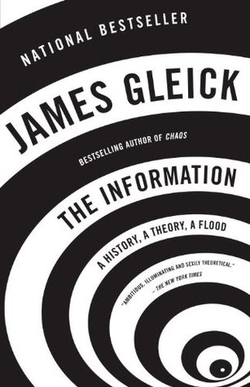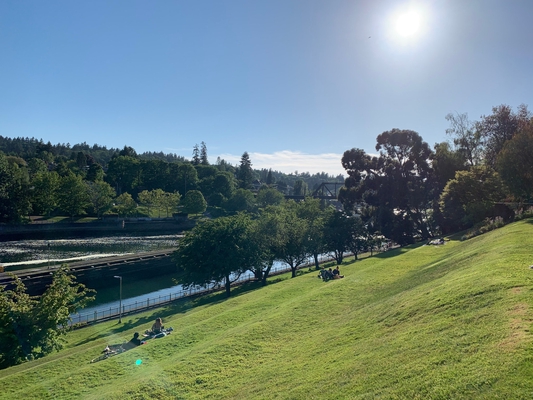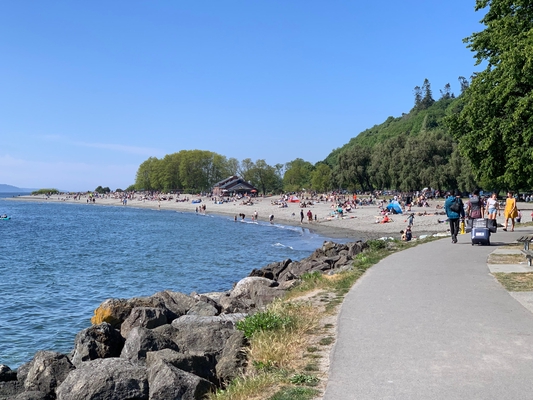COVID: May was a good month on the COVID front in Washington. Vaccines were generally available – and at least 56% of adults have gotten their first dose. Washington is on track to “reopen” completely by June 30th. All good news! Things are progressing faster and with fewer negative surprises than I expected.
Though, since the CDC decided (somewhat prematurely, in my opinion) to remove the mask mandate/recommendation for vaccinated people, we’re now in a strange liminal state of some people masking and others choosing not to. For my part, I’m still wearing a mask, particularly in crowded areas or stores, but… we’re getting to the point where that isn’t strictly necessary anymore, which is a good thing.
Work: My last “Recently” post discussed some complacency I was feeling at work. Since then, I’ve switched teams to a completely different domain, and I’ve been really happy with the move. I’m working on a more backend-facing team on a product that I’m pretty excited about (I’ll be able to write more about this later, I hope).
In May, I was also able to work from an office for the first time since the beginning of the pandemic. The first time I went back felt strange, but it’s becoming more “normal” as time goes on. It’s great to see (some of) my coworkers in person again, even if only for a day or two a week. Rediscovering the hassle of commuting has made me a bit hesitant to go back to the “old” routine of office work, but time will tell how much we end up working from traditional office spaces vs. at home.
Reading: The Information
The book I’ve most enjoyed reading this month has been James Gleick’s The Information: A History, a Theory, a Flood. It’s a fairly thorough history of information theory. Gleick traces the development of the understanding of information as something that can be quantified: from African talking drums and the invention of writing, to optical telegraphs and Morse code, to Charles Babbage and Ada Lovelace’s early work in programmable machines, to Claude Shannon’s discovery of “information theory” around WWII, to Godel’s incompleteness theorem and Turing’s universal machine, to complexity and chaos theory, to genetics and memetics, to quantum cryptography and Hawking radiation, and finally to the Internet and Wikipedia (the titular “Flood”).

This is one of those books that remains compelling even if you’re already familiar with the general beats of the story, due to a well-constructed throughline. There are also tons of bits of interesting trivia, such as the fact that Charles Babbage “invented the modern idea of standardized postal rates”, or that French quashed its nascent private optical telegraph system in 1837, since early telegraph networks were seen more as a tool of state power than a medium of communication.
Pairs well with: Gödel, Escher, Bach, A Short History of Nearly Everything.
Ballard
This month I went on a staycation to Ballard. It’s a great part of Seattle, and I’ve wanted to spend more time there for a while. Among other things, it has a strong Scandinavian influence and has the most-trafficked locks system in the US. (The Ballard Locks, and nearby botanical garden, are some of my favorite places to visit in the city.)

Spring Evening at the Ballard Locks
Ballard has a reputation in Seattle of being a bit “out there” geographically – it’s part of the City of Seattle, but historically it was basically its own town. Though, going from Ballard and downtown is about a 15 minute drive (30 by transit), so it’s not really that bad.
On one particularly nice day, I went on a run to one of Seattle’s few sandy beaches – Golden Gardens Park. There were swaths of people enjoying the weather. Starting to get “post-pandemic” vibes from the city now. 😎

Golden Gardens Beach
Assorted Links
- How Litestream Eliminated My Database Server for $0.03/month
- I first got turned on to the power of SQLite from the Datasette project, and have since been using SQLite wherever I can. Litestream is another really intriguing use of SQLite: it provides real-time replication of SQLite to cloud storage (e.g. S3). Combined with containerization and functions-as-a-service, I think this could be used to have a true scale-to-zero lockin-free serverless database. Litestream is a very cool idea, and I’m itching for an excuse to use this in some upcoming project.
- proposal: slices: new package to provide generic slice functions
- More details are starting to roll out about Go’s upcoming support for
generics. This
slicespackage proposal makes me excited: it adds generic implementations ofMap,Reduce,Filter, andContainsto slices. This would cover like 90% of my wants for generics, and it’s going to be in the standard library (hopefully). Promising stuff!
- More details are starting to roll out about Go’s upcoming support for
generics. This
- Seasoning Your Baking Sheets to Improve Browning
- This blew my mind. I never thought that baking sheets getting browned over time actually was a benefit – I thought that they brownish coating that builds up on baking sheets was just kinda unsightly and gross. Turns out that, like cast iron, the “seasoning” layer of solidified oils helps with browning and reduces sticking. I got some new baking sheets last year and was disappointed that, initially, food would stick like crazy to them in the oven. Now that they’ve seasoned over time, they work great.
- A Brief Introduction to Esoteric Languages
- A great exploration of esoteric programming languages. The most interesting to me of this list is Befunge, which is a language that is designed to be as difficult as possible to compile.
- Expensive megaprojects that went wrong
- *sad trombone*
- How Eliud Kipchoge Pulled Off His Epic, Sub-2-Hour Marathon
- TL;DR: It was a collaborative effort with a set of other runners (i.e. not in a competitive race), where the other runners shielded Kipchoge from the wind. Incredibly impressive.
- The Battle of Sharks! - Lovely story about a municipal zoning dispute qua art project in London.